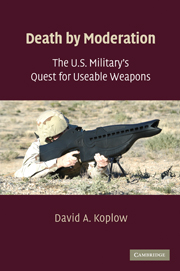Book contents
- Frontmatter
- Contents
- Preface
- Acknowledgments
- Abbreviations and Acronyms
- 1 Revolutionary Weapons and Transformed War
- 2 Deterrence and Self-Deterrence
- 3 The Law of Armed Conflict
- 4 Precision-Guided Munitions
- 5 Low-Yield Nuclear Weapons
- 6 Smart Antipersonnel Land Mines
- 7 Antisatellite Weapons
- 8 Nonlethal Weapons
- 9 What to Do about Useability
- Index
- References
9 - What to Do about Useability
Published online by Cambridge University Press: 05 June 2012
- Frontmatter
- Contents
- Preface
- Acknowledgments
- Abbreviations and Acronyms
- 1 Revolutionary Weapons and Transformed War
- 2 Deterrence and Self-Deterrence
- 3 The Law of Armed Conflict
- 4 Precision-Guided Munitions
- 5 Low-Yield Nuclear Weapons
- 6 Smart Antipersonnel Land Mines
- 7 Antisatellite Weapons
- 8 Nonlethal Weapons
- 9 What to Do about Useability
- Index
- References
Summary
“We knew that no single bomb would win the war, but also that one wayward bomb could lose it.” That melancholy insight, from an anonymous senior instructor at a 2002 U.S. Air Force training course, neatly summarizes the warfighter's current conundrum, and it encapsulates much of the unsettling motivation animating the American pursuit of “useable” weapons. In contemporary combat – even as the “global war on terror” morphs into “the long war” – no one battle, no single engagement, still less any individual bomb, can decisively turn the campaign in our favor. But one erroneous munition – inaccurately placed, too large in its effects, lasting too long, or otherwise failing to discriminate between valid targets and protected civilians – could potentially so poison the political atmosphere that the support of the population (at home, in the theater of battle, and around the world) could be irretrievably compromised, sacrificing an indispensable element in winning the war. That spirit – driving the military to be, in equal measure, both effective and deft – is responsible for the current fascination with weapons that are less deadly, less destructive, and less powerful than their predecessors.
Still, a skeptical reader might ask, “What's the big deal here? The Pentagon always buys new weapons – for offense and for defense; for air, sea, and land. If ever there were a ‘dog bites man’ story, it would be a recital about the U.S. Department of Defense trying to develop new generations of advanced armaments.”
Information
- Type
- Chapter
- Information
- Death by ModerationThe U.S. Military's Quest for Useable Weapons, pp. 216 - 258Publisher: Cambridge University PressPrint publication year: 2009
